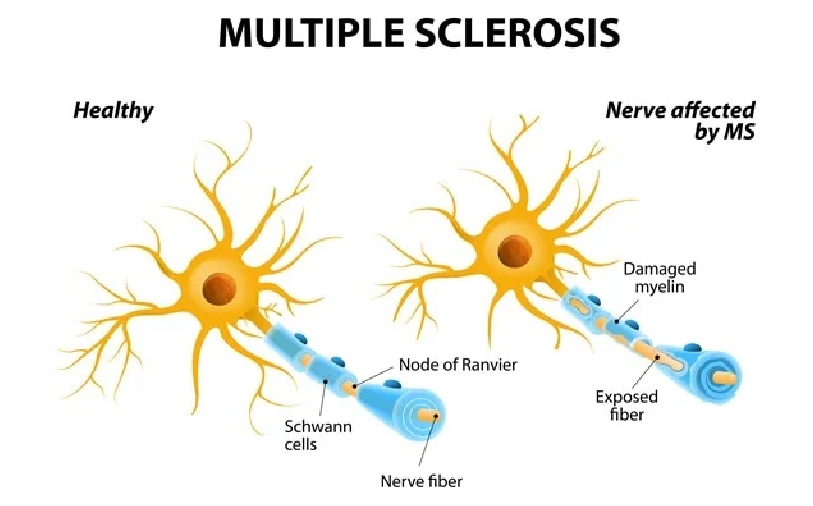Book an Appointment
Call Us+91 9319488481Multiple Sclerosis (MS) is a chronic autoimmune disease where the immune system attacks the protective myelin sheath covering nerve fibers in the central nervous system (CNS). This damage disrupts communication between the brain and other parts of the body, leading to symptoms such as fatigue, vision changes, numbness, muscle weakness, and balance issues.
The disease begins when the immune system targets the myelin sheath, an insulating material around the brain and spinal cord nerve fibers. This disruption of signals between the brain and other parts causes symptoms like fatigue, changes in vision, numbness, muscle weakness, and balance difficulties. Early diagnosis and appropriate treatment are crucial for managing the disease effectively and improving the overall quality of life for individuals diagnosed with Multiple Sclerosis. India, particularly Bangalore, is renowned for its medical facilities and healthcare practitioners who utilize modern techniques to manage and treat MS.
Multiple Sclerosis is an autoimmune disease in which the immune system attacks the protective covering of the nerves, causing inflammation and the formation of scar tissue. This damage interferes with the normal functioning of electrical signals along nerve fibers, leading to neurological manifestations. The exact cause of this immune response remains unclear, but genetic and environmental factors are believed to contribute to the development of MS.

Types of MS are listed below:
The most common type, characterized by clearly defined relapses (new or worsening symptoms) and remissions (partial or complete improvement of symptoms). During remission, patients may experience significant improvement, though some effects may persist.
Initially classified as RRMS, this type may eventually progress to a stage where symptoms gradually worsen, with or without relapses. SPMS is characterized by gradual decline in neurological function with fewer acute relapses.
Characterized by a steady decline in physiological function from the onset, with few or no relapses. The progression is continuous, with occasional plateaus.
This type involves gradually worsening neurological function from the start, with occasional relapses. PRMS is marked by a continuous worsening of symptoms, interspersed with flare-ups.
Treatment for MS depends on the type and stage of the disease, and the aim is to minimize the impacts of the disease and enhance the individual's quality of life.
Disease- Modifying Therapies (DMTs) aim to reduce the progression of MS, decrease the number of relapses, and lessen damage to the CNS. Commonly prescribed DMTs include:
Interferon Beta: A group of drugs with immunosuppressive properties that help reduce inflammation.
Symptomatic treatments address specific symptoms of MS, including:
Pain Management: Therapies for neuropathic pain and muscle spasm medications.
Fatigue Reduction: Treatments for chronic fatigue syndrome and strategies to prevent it.
Spasticity Control: Interventions such as muscle relaxants to manage spasticity and stiffness.
Bladder/Bowel Dysfunction: Medications and general approaches to treating urinary and bowel dysfunction.
Bangalore is renowned for its advanced healthcare services and has several top hospitals and neurology centers offering state-of-the-art treatment for MS.
Hospitals and Neurology Centers: Bangalore boasts some of the best hospitals and neurology centers in India, equipped with advanced technology and staffed by experienced professionals.
Expertise and Experience: The city hosts numerous neurologists and MS specialists with expertise in handling MS, using sophisticated diagnostic and interventional tools.
Diagnostic Tools: Bangalore offers state-of-the-art diagnostic tools, including:
Treatment Options: Bangalore provides access to the latest DMTs and advanced symptomatic treatments.
Cost Considerations: The treatment costs of MS in Bangalore vary based on the type of treatment and health facility. Many hospitals offer payment options and accept various insurance types to ease the financial burden. Costs are estimates and may vary depending on insurance coverage, so consulting with healthcare providers is recommended.
Rehabilitation is crucial for managing MS, focusing on enhancing functionality, controlling symptoms, and improving overall quality of life.
Rehabilitation Centers: Bangalore City has various rehabilitation departments offering comprehensive programs for MS patients.
Physical Therapy: Aim to improve mobility, muscle strength, and coordination through targeted exercises.
Occupational Therapy: Focuses on helping patients adjust their daily activities to maintain their quality of life.
Speech Therapy: Assists with communication problems and dysphagia (difficulty swallowing).
Benefits of Rehabilitation: Programs can help:
Manage Symptoms: Treat pain, fatigue, and spasticity.
Improve Function: Improve muscle strength, balance, and coordination.
Adapt to Changes: Develop strategies for managing disabilities and using assistive technologies.
Enhance Quality of Life: Maintain emotional and psychological health, personal autonomy, and overall satisfaction.
In India, Bangalore stands out as a premier destination for Multiple Sclerosis treatment, offering cutting-edge procedures, experienced physicians, and advanced health facilities. Early diagnosis and timely treatment are essential for managing MS effectively and maintaining a good quality of life. Consulting with a qualified specialist in Bangalore ensures a personalized treatment plan tailored to individual needs, optimizing outcomes and enhancing overall well-being.